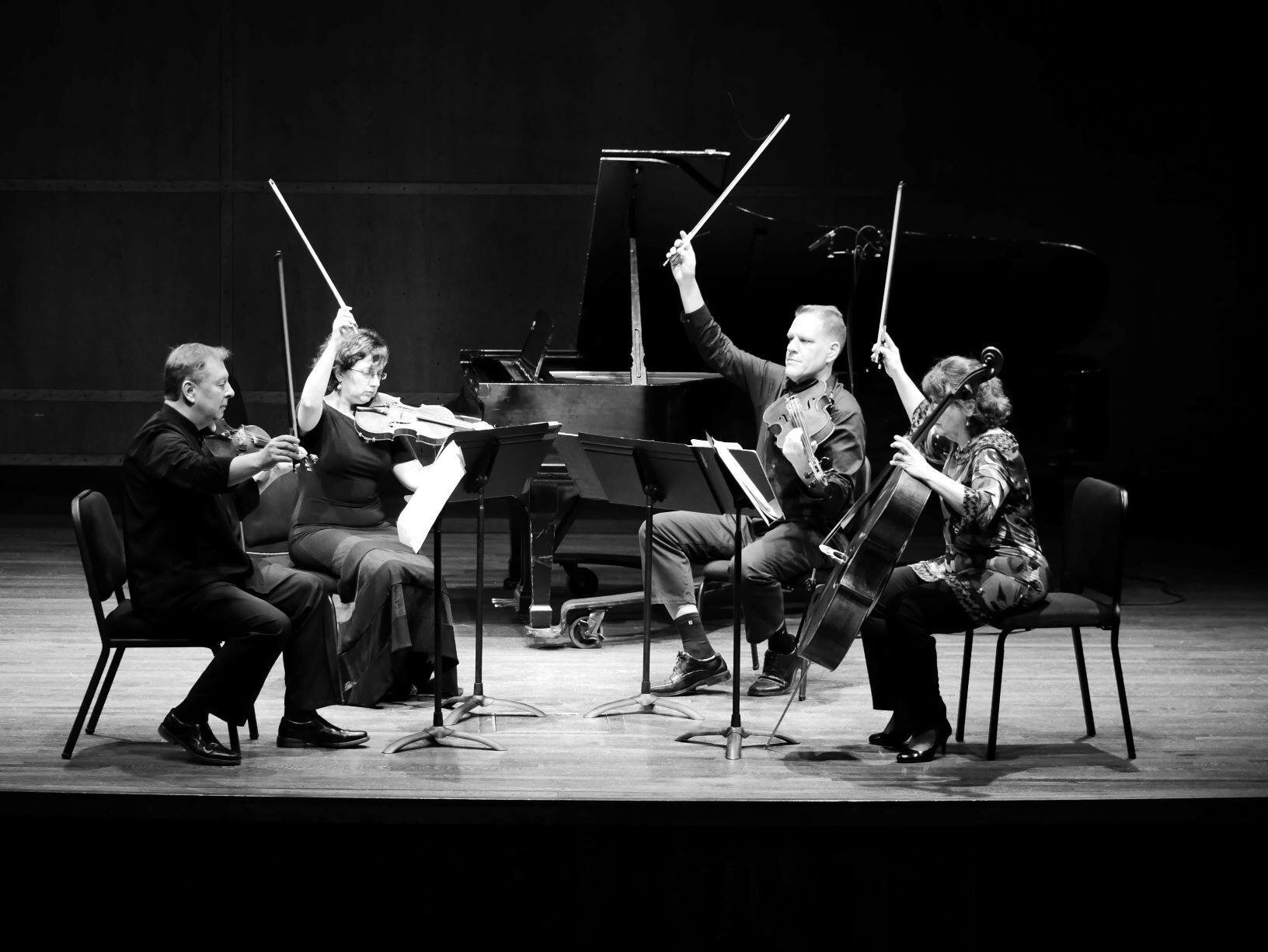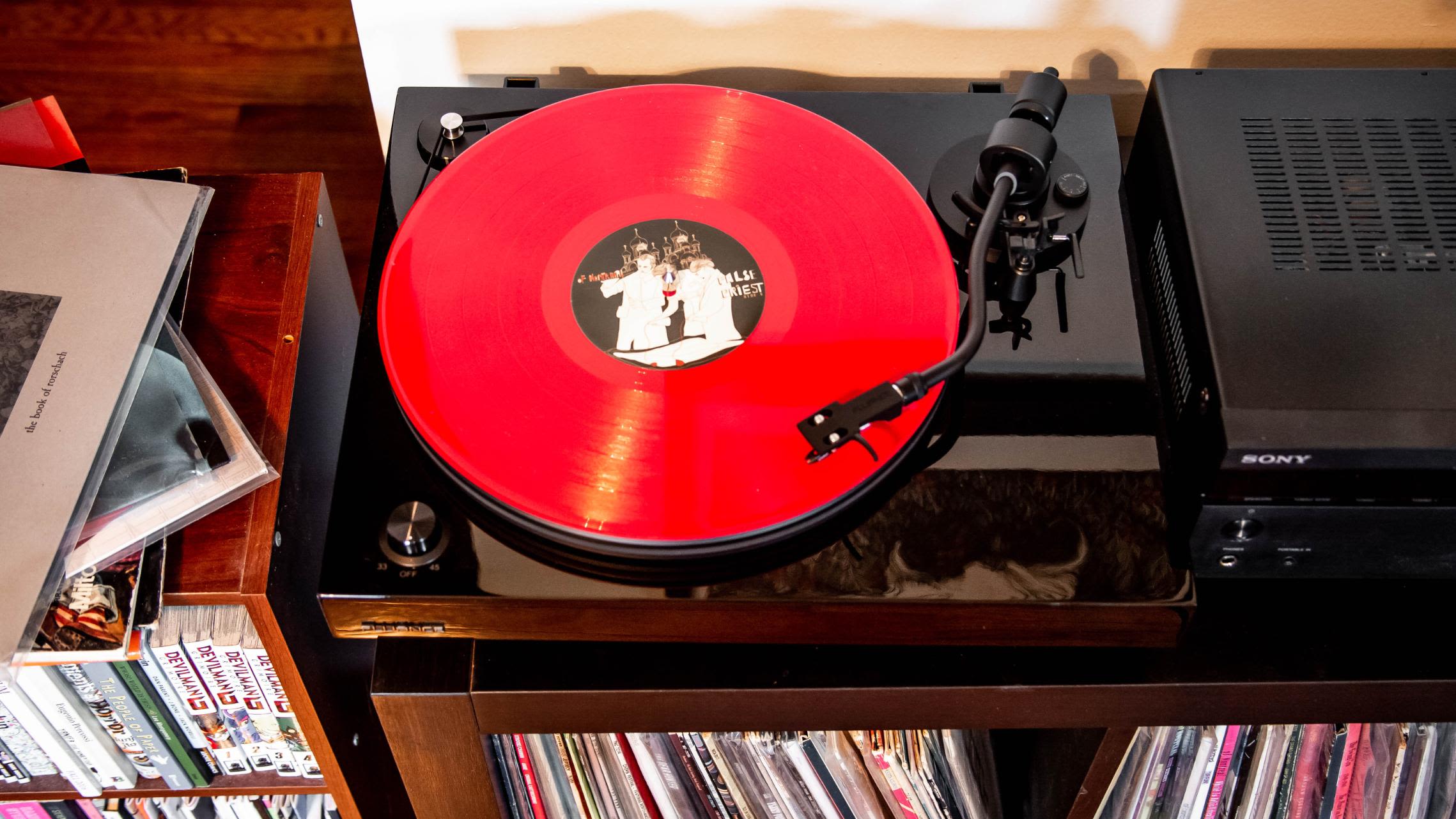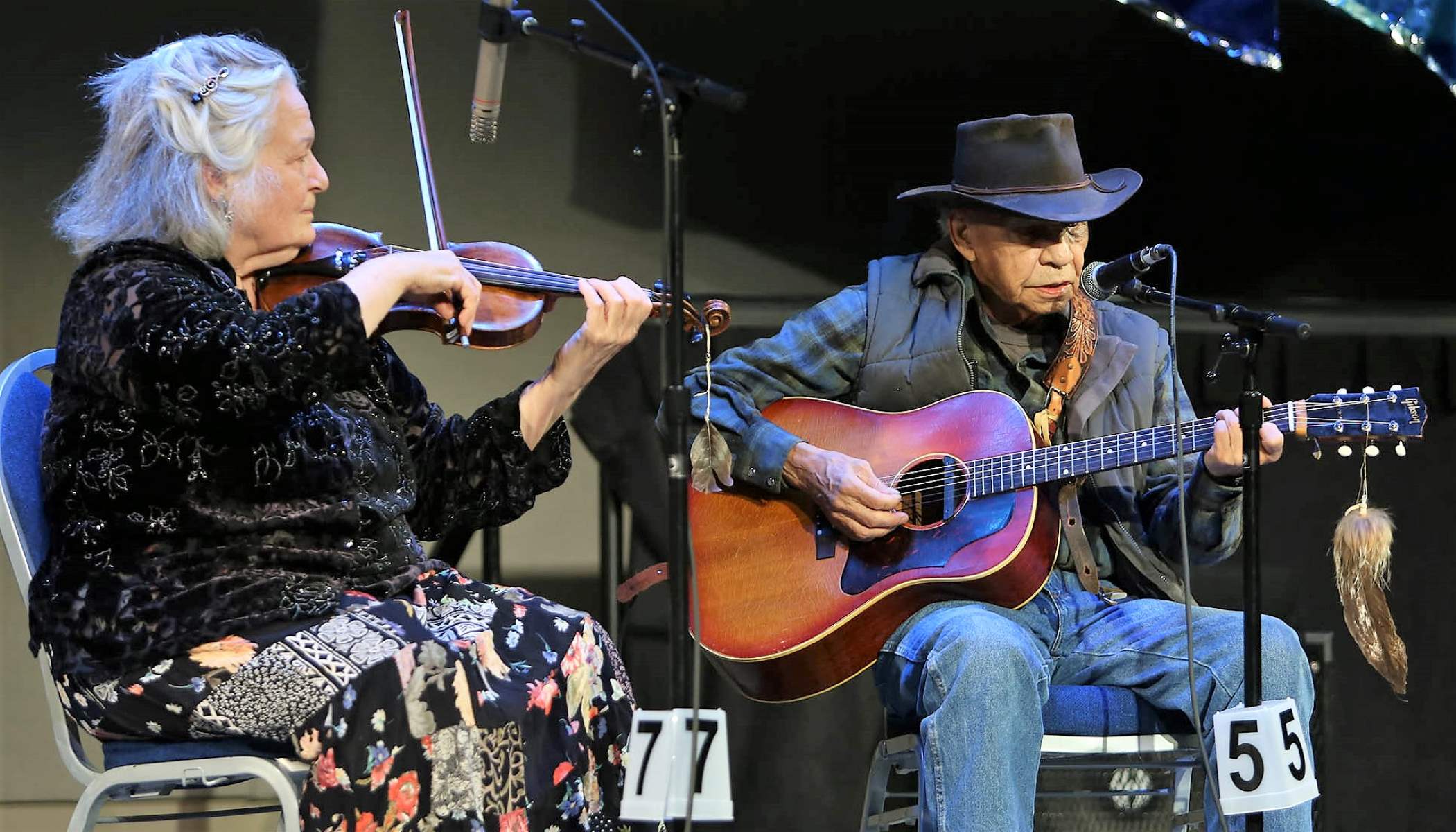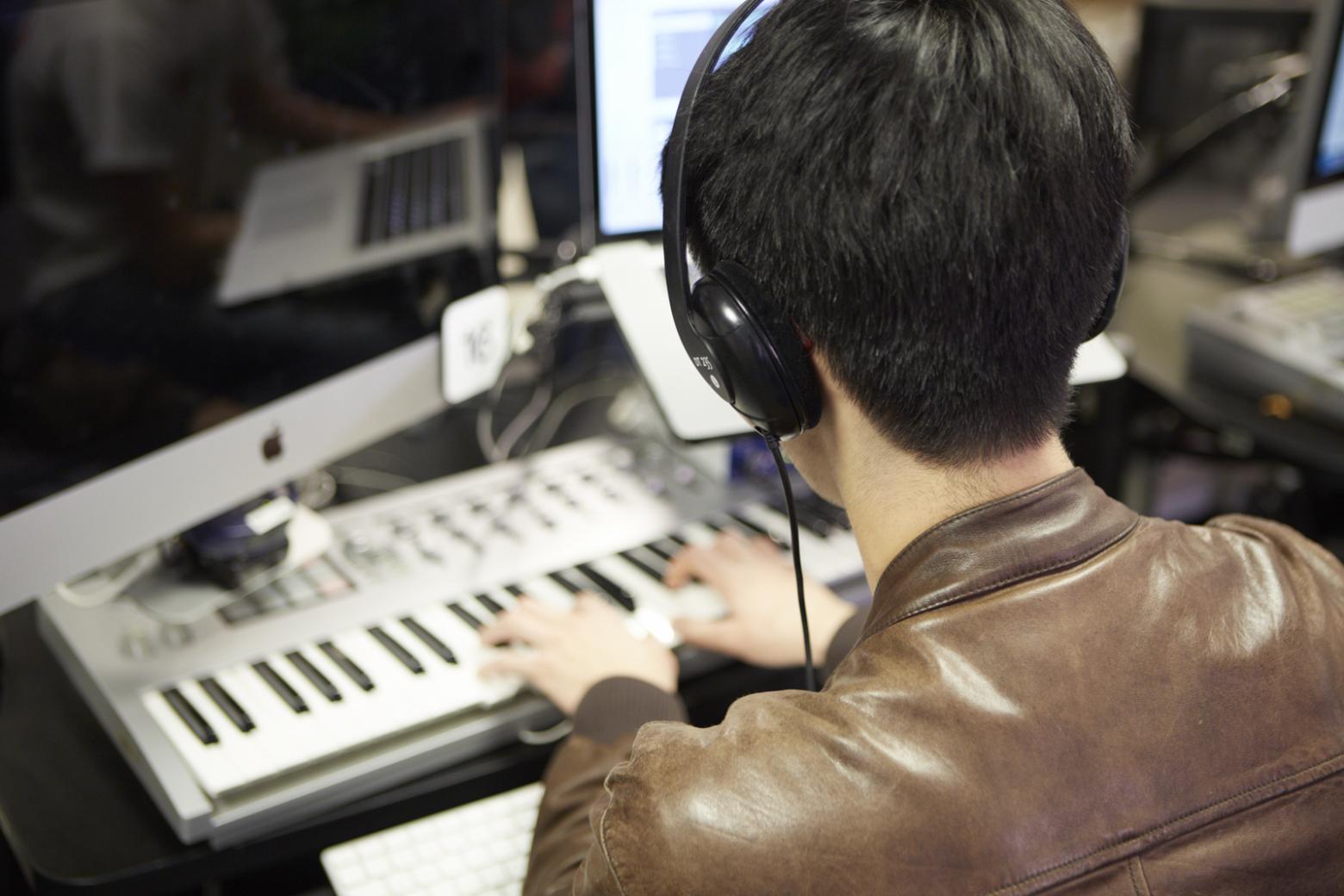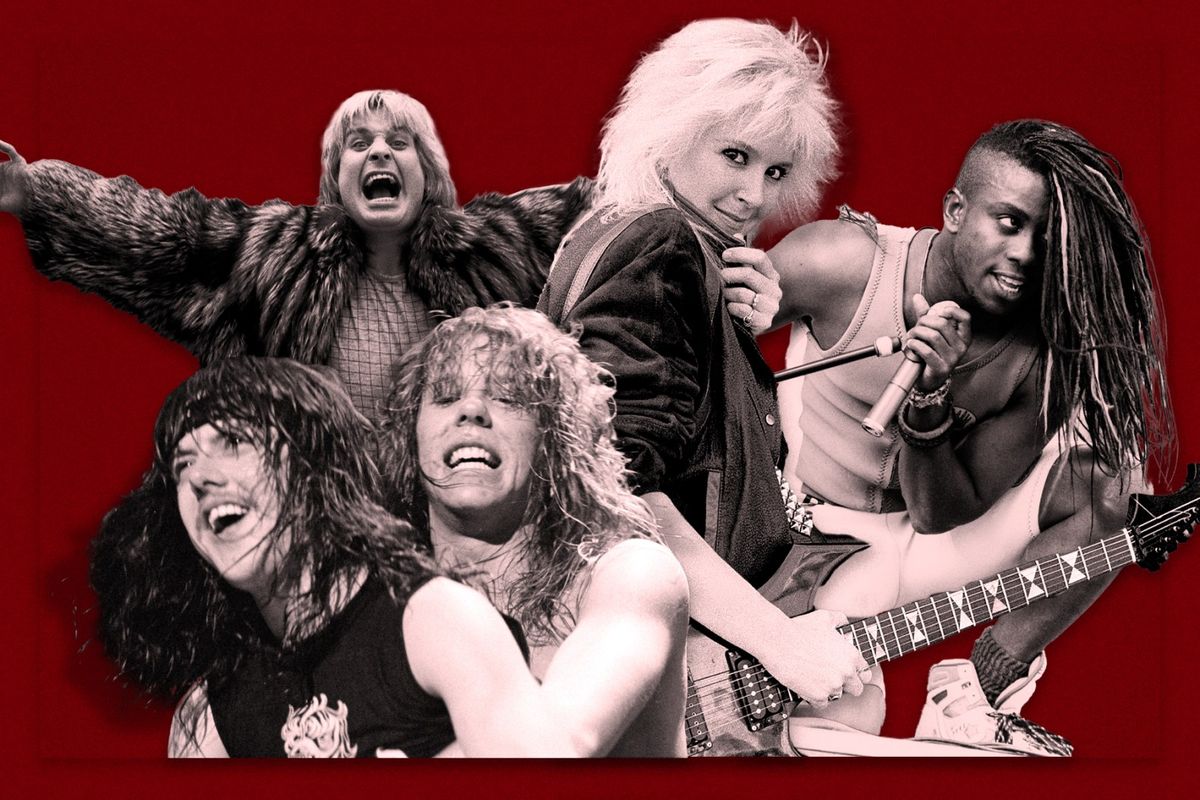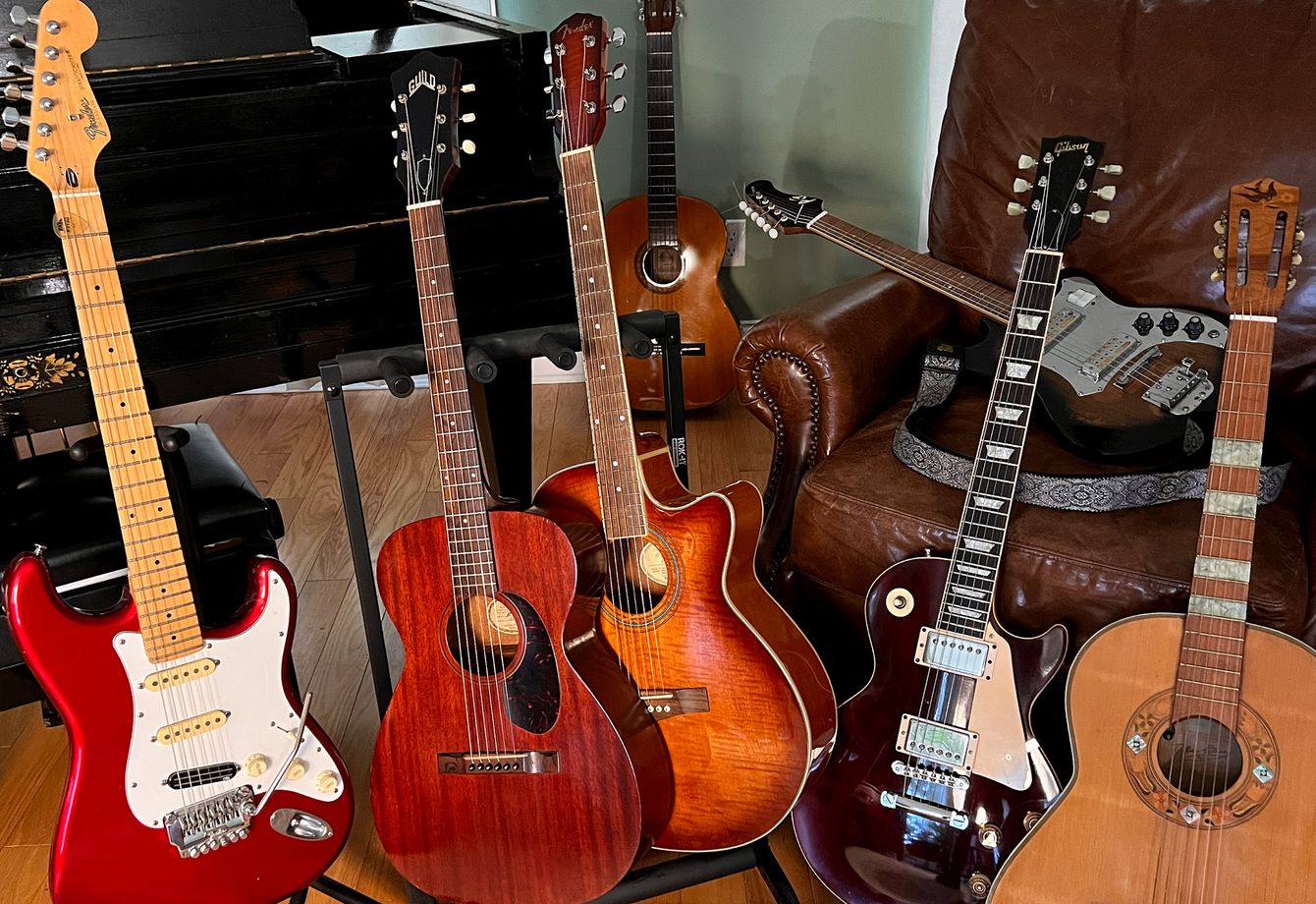Home>Events & Info>Music Therapy>What Is The Difference Between Music Therapy And Music Entertainment


Music Therapy
What Is The Difference Between Music Therapy And Music Entertainment
Published: February 2, 2024
Discover the distinction between music therapy and music entertainment. Learn about the therapeutic benefits of music therapy and how it differs from mere entertainment.
(Many of the links in this article redirect to a specific reviewed product. Your purchase of these products through affiliate links helps to generate commission for AudioLover.com, at no extra cost. Learn more)
Table of Contents
- Introduction
- Definition of Music Therapy
- Definition of Music Entertainment
- Goals and Objectives of Music Therapy
- Goals and Objectives of Music Entertainment
- Techniques and Approaches Used in Music Therapy
- Techniques and Approaches Used in Music Entertainment
- Training and Education Required for Music Therapists
- Training and Education Required for Music Entertainers
- Benefits and Outcomes of Music Therapy
- Benefits and Outcomes of Music Entertainment
- Target Audience of Music Therapy
- Target Audience of Music Entertainment
- Ethical Considerations in Music Therapy
- Ethical Considerations in Music Entertainment
- Conclusion
Introduction
Music has been used as a powerful form of expression and communication for centuries, with the ability to evoke emotions and connect people on a deep level. In recent years, the fields of music therapy and music entertainment have gained prominence in their respective domains. While both revolve around the use of music, they have distinct differences in their goals, techniques, and target audiences.
Music therapy is a clinical and evidence-based practice that utilizes music to address physical, emotional, cognitive, and social needs of individuals. It is conducted by trained professionals known as music therapists, who use music interventions to facilitate therapeutic goals and improve overall well-being. Music entertainment, on the other hand, focuses on the performance and enjoyment of music. It encompasses various forms of musical expression, such as live concerts, recordings, and music festivals, with the primary aim of entertaining and engaging audiences.
While the distinction between music therapy and music entertainment may seem subtle, understanding their differences is crucial to ensure appropriate utilization and communication of their respective benefits. For individuals seeking musical experiences, it is essential to recognize the unique goals and outcomes offered by each field.
Definition of Music Therapy
Music therapy is a specialized field that harnesses the power of music to improve physical, emotional, cognitive, and social well-being. It is an evidence-based practice that is administered by certified music therapists. These therapists have extensive training in both music and therapeutic techniques, allowing them to effectively utilize music as a medium for therapeutic interventions.
Music therapy is grounded in the belief that music has unique qualities that can stimulate various aspects of human functioning. By engaging with music in a clinical setting, individuals can experience benefits such as stress reduction, emotional release, increased self-awareness, improved communication skills, and enhanced motor coordination.
In music therapy sessions, the therapist assesses the needs and goals of each individual and designs personalized interventions accordingly. These interventions may include playing instruments, singing, songwriting, listening to music, and engaging in rhythmic exercises. The therapist guides the individual through these activities, creating a safe and supportive environment for exploration and expression.
Music therapy is used to address a wide range of issues across different populations, including children with developmental disabilities, individuals with mental health disorders, patients undergoing medical treatments, and seniors dealing with memory loss or dementia. It is a holistic approach that considers the physical, emotional, cognitive, and social aspects of a person’s well-being.
One of the main tenets of music therapy is the concept of non-verbal communication. Music has the ability to transcend language and can be an effective means of expression for those who struggle with verbal communication. This makes music therapy particularly valuable for individuals with communication disorders or those who find it difficult to express their emotions verbally.
Music therapy sessions are conducted in various settings, including hospitals, rehabilitation centers, schools, mental health facilities, and private practice. The therapist collaborates with other healthcare professionals to ensure comprehensive care and may incorporate music into other therapeutic interventions, such as occupational therapy or speech therapy.
Definition of Music Entertainment
Music entertainment is a broad term that encompasses various activities centered around musical performances and experiences. It refers to the use of music as a form of entertainment and enjoyment, both for the performers and the audience. Music entertainment can take many forms, including live concerts, recorded music, music festivals, musical theater, and other forms of musical expression.
The primary goal of music entertainment is to engage and entertain audiences through the power of music. It is a creative and artistic endeavor that showcases the talents and skills of musicians, singers, and other performers. Music entertainment is often associated with popular music genres, such as pop, rock, hip-hop, jazz, and classical, catering to diverse tastes and preferences.
Unlike music therapy, which focuses on therapeutic outcomes, music entertainment is primarily focused on providing enjoyment, entertainment, and artistic expression. It aims to create an immersive and memorable experience for spectators who appreciate the artistry and performances of musicians.
Music entertainment can range from intimate performances in small venues to large-scale concerts and music festivals that attract thousands of attendees. It often involves elaborate stage setups, lighting effects, and audiovisual enhancements to enhance the overall spectacle and impact of the performance.
In addition to live performances, recorded music in the form of albums, singles, and music videos also play a significant role in music entertainment. These mediums allow musicians and artists to reach a wide audience and showcase their musical talents beyond just live performances.
Music entertainment is a multifaceted industry that encompasses not only the performers but also professionals in areas such as event management, production, sound engineering, marketing, and promotion. It serves as a platform for musicians to showcase their skills, gain recognition, build a fan base, and potentially achieve commercial success.
Music entertainment plays a vital role in popular culture and serves as a means of personal expression, storytelling, and social commentary. It brings people together, evokes emotions, and creates shared experiences that transcend cultural and societal boundaries.
It is important to note that while music entertainment can evoke emotional responses and personal connections, it is not considered a therapeutic intervention and does not provide the same targeted benefits as music therapy.
Goals and Objectives of Music Therapy
The goals and objectives of music therapy are focused on using music as a therapeutic tool to address specific physical, emotional, cognitive, and social needs of individuals. These goals are tailored to the unique circumstances and abilities of each person, and the interventions used in music therapy are designed to support and facilitate the achievement of these goals.
Some common goals of music therapy include:
- Promoting emotional well-being: Music therapy aims to help individuals express and regulate their emotions effectively. It can provide a safe and non-threatening outlet for emotional release, allowing individuals to process and manage their feelings.
- Improving communication skills: Music has the power to transcend language barriers and can serve as a means of communication for individuals who struggle with verbal expression. Music therapy can help individuals develop and enhance their communication skills, both through receptive listening and expressive musical activities.
- Enhancing cognitive abilities: Music therapy can stimulate cognitive processes, such as memory, attention, and problem-solving. It can be especially beneficial for individuals with cognitive impairments or neurodevelopmental disorders, as it provides a structured and engaging environment for cognitive stimulation.
- Encouraging physical rehabilitation: Music therapy can be utilized to promote physical movement, coordination, and motor skills. Rhythmic activities and instrument playing can help individuals improve their fine and gross motor abilities, as well as enhance their overall physical functioning.
- Fostering social interaction and connection: Music has a unique ability to bring people together and create a sense of community. Music therapy provides opportunities for social interaction, collaboration, and connection, fostering interpersonal skills and building relationships.
While these goals are common in music therapy, it is important to note that they may vary depending on the specific needs and objectives of each individual. The music therapy process is highly individualized, and therapists work closely with their clients to identify and prioritize goals that are relevant to their circumstances.
The objectives of music therapy are the specific steps and interventions taken to achieve these goals. These can include singing exercises, instrument playing, lyric analysis, improvisation, guided relaxation, music-assisted imagery, and songwriting, among others. The choice of interventions is based on the client’s needs, preferences, and therapeutic goals.
Ultimately, the primary goal of music therapy is to improve the overall well-being and quality of life of individuals through the power of music. It provides a unique and effective approach to therapy that is both engaging and enjoyable, utilizing the inherent therapeutic qualities of music to address various needs and promote holistic healing.
Goals and Objectives of Music Entertainment
The goals and objectives of music entertainment differ from those of music therapy, as they are primarily focused on providing enjoyment, entertainment, and artistic expression to audiences. While music entertainment may not have therapeutic outcomes as its primary aim, it serves important purposes in the realm of entertainment and cultural enrichment.
Some common goals and objectives of music entertainment include:
- Entertainment and enjoyment: The primary objective of music entertainment is to entertain and engage audiences through musical performances. Whether it’s a live concert, a recorded album, or a music video, the goal is to provide an enjoyable and captivating experience for listeners and viewers. Music entertainment aims to evoke emotions, create a memorable experience, and bring pleasure to the audience.
- Showcasing talent and artistry: Music entertainment provides a platform for musicians, singers, and performers to showcase their artistic abilities and talents. It allows them to express their creativity, hone their skills, and gain recognition for their musical accomplishments. Music entertainment can be a stepping stone for emerging artists to gain exposure and reach a wider audience.
- Celebration of culture and diversity: Music entertainment celebrates the diversity and richness of musical styles, genres, and traditions from different cultures around the world. It provides a platform for musicians to share their cultural heritage and for audiences to gain a deeper appreciation for the beauty and richness of various musical traditions.
- Engaging and connecting with audiences: Music entertainment aims to establish a connection and interaction between performers and audiences. It strives to create a sense of unity and shared experience among concertgoers and listeners. Music has the power to bring people together, regardless of their backgrounds or beliefs, and music entertainment leverages that power to foster a sense of community.
- Creative expression and storytelling: Music entertainment allows artists to express themselves creatively and use music as a medium for storytelling. Song lyrics, melodies, and harmonies can convey powerful narratives, emotions, and messages. Music entertainment provides a platform for artists to share their stories, perspectives, and experiences through their music.
While the goals and objectives of music entertainment are different from those of music therapy, they contribute to the cultural enrichment, artistic expression, and social connection in society. Music entertainment serves as a form of artistic expression, celebration, and source of joy for audiences, offering a diverse range of musical experiences and performances that cater to various tastes and preferences.
It is important to recognize the distinct goals and objectives of music entertainment and appreciate its role in providing entertainment and artistic expression, separate from the therapeutic aims of music therapy. Both fields play valuable roles in the world of music, catering to different needs and enriching people’s lives in unique ways.
Techniques and Approaches Used in Music Therapy
Music therapy encompasses a wide range of techniques and approaches that are tailored to the needs and goals of each individual. These techniques are designed to utilize the therapeutic qualities of music to address physical, emotional, cognitive, and social needs. Music therapists combine their knowledge of music theory, psychology, and therapeutic principles to guide their interventions.
Some of the commonly used techniques and approaches in music therapy include:
- Active music making: This technique involves actively engaging individuals in creating music through playing instruments, singing, or using their voices. Active music making promotes self-expression, emotional release, and physical coordination. It can range from simple rhythmic exercises to more complex improvisation or composition activities.
- Receptive music listening: Listening to carefully selected music can have profound therapeutic effects. Music therapists use specific songs, genres, or compositions to evoke emotional responses, promote relaxation, or encourage reminiscence. Receptive music listening can support individuals in processing emotions, reducing stress, and promoting a sense of well-being.
- Songwriting: Songwriting allows individuals to express themselves through the creation of original songs. This technique encourages introspection, self-reflection, and empowerment. Music therapists facilitate the songwriting process, helping individuals explore their thoughts, feelings, and experiences through lyrics and music.
- Musical improvisation: Improvisation involves spontaneous musical creation without pre-planning or structured guidelines. It allows individuals to freely express themselves musically, promoting creativity, self-confidence, and communication skills. Music therapists provide a supportive environment and may engage in improvisation alongside the client.
- Musical-Verbal Reflection: After engaging in a musical activity, the music therapist helps the individual reflect on and discuss the experience. Musical-Verbal Reflection enables individuals to explore the emotions, thoughts, and meanings that emerged during the musical process. This technique integrates the musical experience with verbal expression, fostering insight and self-awareness.
- Music-assisted relaxation and guided imagery: Music therapists use calming and soothing music to facilitate relaxation techniques, such as deep breathing exercises or progressive muscle relaxation. The music creates a peaceful and supportive environment, aiding in stress reduction and promoting a sense of calm. Guided imagery involves using music to enhance visualization and imagination, supporting individuals in accessing their inner resources and promoting positive mental imagery.
Music therapists select and adapt these techniques based on the individual’s preferences, clinical needs, and treatment goals. The therapeutic relationship between the therapist and the client plays a vital role in determining which approaches are most effective for achieving the desired outcomes.
It is important to note that the application of these techniques may vary depending on the population being served. Music therapists working with children, for example, may incorporate play-based techniques and interactive musical games to engage and facilitate therapeutic goals. Similarly, music therapists working with individuals with neurological disorders may use techniques that target motor skill development and cognitive rehabilitation.
Overall, the techniques and approaches used in music therapy are diverse and flexible, allowing therapists to tailor interventions to the unique needs and abilities of each individual. The goal is to create a safe and supportive space where individuals can engage with music in ways that promote healing, growth, and well-being.
Techniques and Approaches Used in Music Entertainment
Music entertainment employs a variety of techniques and approaches to captivate audiences and create memorable experiences. These techniques focus on engaging and entertaining the listeners, showcasing the artistry of musicians, and creating an immersive musical atmosphere. While the techniques used in music entertainment may vary depending on the specific genre and performance format, there are some common approaches utilized in this field.
1. Live Performances: Live performances are a core component of music entertainment. Artists use their talent and stage presence to engage the audience, delivering captivating performances that showcase their musical skills. Singers, bands, and instrumentalists often incorporate choreography, interactive elements, and crowd participation to create a dynamic and engaging experience.
2. Set Design and Visuals: Visual elements play a significant role in music entertainment, enhancing the overall experience. Set design, stage lighting, video projections, and other visual effects are used to create visually stimulating and immersive environments that complement the music. These elements are carefully curated to enhance the mood, theme, and atmosphere of the performance.
3. Sound Engineering: Sound engineering ensures that the music is amplified and balanced well during live performances and recorded music. Sound engineers use advanced audio equipment and techniques to create a high-quality sound experience for the audience. They work closely with musicians to achieve the desired sound and ensure that the music is heard clearly and intelligibly.
4. Stage Presence and Showmanship: Musicians in the entertainment industry often employ techniques to engage the audience and leave a memorable impression. This includes charismatic stage presence, lively interactions with the crowd, and captivating gestures or dance moves. These techniques are intended to create a connection between the artist and the audience, enhancing the overall entertainment value of the performance.
5. Multimedia Integration: Many music entertainment performances incorporate multimedia elements such as video projections, live streaming, or synchronized light shows. These integrations enhance the visual and audio experience, creating a multi-sensory spectacle that captivates the audience and brings the music to life in a dynamic way.
6. Storytelling Through Music: Some music entertainment performances utilize storytelling techniques to create a narrative or convey a message. This can be achieved through the selection and arrangement of songs to create a compelling storyline or theme. The music and lyrics work together to tell a story or evoke specific emotions, allowing the audience to become immersed in the performer’s artistic vision.
7. Interdisciplinary Collaborations: Music entertainment often involves collaborations between musicians, dancers, visual artists, and other performers. These collaborations can result in an interdisciplinary fusion of different art forms, creating unique and immersive experiences. Through these collaborations, artists push the boundaries of traditional music performances and explore new artistic expressions.
The techniques and approaches used in music entertainment are diverse and constantly evolving, reflecting the creativity and innovation within the industry. They aim to entertain and engage the audience, delivering memorable performances that celebrate the beauty and power of music.
Training and Education Required for Music Therapists
Becoming a music therapist requires a combination of musical proficiency, therapeutic knowledge, and clinical skills. Music therapists undergo specific training and education to develop the necessary competencies to practice effectively in the field. The training and education requirements for music therapists typically include the following:
1. Bachelor’s Degree: A bachelor’s degree in music therapy or a related field is the minimum educational requirement to become a music therapist. This degree program provides a comprehensive understanding of music theory, music therapy principles, and foundational knowledge in psychology, human development, and physiology.
2. Accredited Music Therapy Program: It is important for aspiring music therapists to complete a program that is accredited by the American Music Therapy Association (AMTA). These programs ensure that students receive a quality education that meets the standards and competencies set by the profession.
3. Clinical Experience: In addition to coursework, aspiring music therapists are required to complete a certain number of supervised clinical hours. These clinical experiences provide hands-on training in applying music therapy techniques, developing therapeutic relationships with clients, and implementing interventions in various settings, such as hospitals, schools, and community centers.
4. Certification: Following the completion of a bachelor’s degree and clinical training, individuals must pass the certification exam administered by the Certification Board for Music Therapists (CBMT). This exam assesses their knowledge and proficiency in music therapy practice and clinical skills.
5. Continuing Education: Music therapists are encouraged to engage in ongoing professional development to stay updated with the latest research, interventions, and therapeutic techniques. Continuing education can include attending workshops, conferences, pursuing advanced degrees, and participating in specialized training programs.
6. Licensure and State Requirements: Requirements for licensure vary by state and country. Some jurisdictions may require music therapists to obtain a license to practice independently. It is important for music therapists to research and comply with the specific regulations and licensing requirements in the jurisdiction where they plan to practice.
Music therapists may also choose to pursue advanced degrees, such as a master’s or doctoral degree, to further specialize in specific areas of practice or research. These advanced degrees provide opportunities for in-depth study, advanced clinical training, and leadership roles within the field of music therapy.
It is worth noting that the field of music therapy is highly interdisciplinary, and aspiring music therapists should be prepared to acquire knowledge and skills in areas such as psychology, counseling, and healthcare. They must possess a deep understanding of the therapeutic applications of music and be able to apply their musical proficiency within a therapeutic context.
By completing the necessary training and education, music therapists are equipped with the knowledge, skills, and ethical understanding required to work effectively with diverse populations and address a variety of therapeutic needs through the power of music.
Training and Education Required for Music Entertainers
Becoming a music entertainer often follows a different path compared to music therapy. While formal education and certifications are not always required, honing musical skills, developing stage presence, and gaining practical experience are essential for success in the field of music entertainment. Here are some key aspects of training and education often pursued by music entertainers:
1. Musical Training: A strong foundation in music is crucial for music entertainers. This typically involves learning to play an instrument, developing vocal skills, and understanding music theory. Many music entertainers pursue formal training through private lessons, music schools, or conservatory programs to advance their musical abilities and develop technical expertise.
2. Performance and Stagecraft: Music entertainers need to develop strong stage presence, charisma, and the ability to engage and captivate an audience. Practical training in performance skills, including movement, choreography, and audience interaction, can be acquired through workshops, acting classes, or participation in school or community theater productions.
3. Songwriting and Composition: Many music entertainers write their own songs or participate in the composition process. Developing skills in songwriting and composition allows entertainers to express their own unique musical style and contribute to their artistic identity.
4. Networking and Collaboration: Building connections within the music industry is essential for music entertainers. Networking events, music conferences, and collaborations with other musicians, producers, and industry professionals provide opportunities for growth, exposure, and potential collaborations for performances and projects.
5. Business and Marketing Skills: Music entertainers often act as entrepreneurs, managing their careers, promoting their work, and booking performances. Developing business and marketing skills, including creating a brand, building an online presence, and understanding contract negotiation, can greatly support the success of music entertainers.
6. Practical Experience: Practical experience is invaluable for music entertainers. This can be gained through regular performances at local venues, open mic nights, talent shows, or even busking. Live performances give entertainers the opportunity to refine their skills, connect with audiences, and receive feedback on their craft.
7. Adaptability and Constant Learning: The music entertainment industry is dynamic and ever-evolving. Music entertainers must embrace a mindset of adaptability and continuous learning. Staying updated with current trends, technological advancements, and new genres and styles allows entertainers to remain relevant and provide fresh and engaging musical experiences for their audiences.
While formal education is not always a prerequisite for music entertainers, many successful artists have pursued music-related degrees or have undergone formal training in performing arts. Additionally, specialized programs and workshops that focus on specific aspects of music entertainment, such as music production or artist management, can provide valuable knowledge and skills.
Ultimately, a combination of talent, practical experience, continuous learning, and a strong work ethic is vital for the training and development of music entertainers. It is a highly competitive field, and success often comes from a combination of passion, dedication, and a commitment to honing one’s craft.
Benefits and Outcomes of Music Therapy
Music therapy offers a range of benefits and outcomes for individuals in various physical, emotional, cognitive, and social contexts. The therapeutic use of music can have profound effects on overall well-being, fostering positive changes and improvements. Here are some key benefits and outcomes of music therapy:
- Emotional Well-being: Music therapy can help individuals manage and express their emotions in a safe and supportive environment. It can promote emotional release, reduce anxiety, and provide a means for emotional exploration and self-reflection.
- Stress Reduction: Engaging with music can have a calming effect on the body and mind. Music therapy techniques, such as guided relaxation and deep breathing exercises, can help individuals reduce stress levels and promote a sense of relaxation and tranquility.
- Improved Communication: Music therapy can enhance communication skills, both verbal and non-verbal. Through singing, playing instruments, or engaging in music-based activities, individuals can improve their expressive and receptive communication abilities. This is particularly beneficial for individuals with communication disorders or cognitive impairments.
- Physical Rehabilitation: Music therapy can support physical rehabilitation by incorporating rhythmic exercises, movement, and instrument playing. These activities can improve motor skills, coordination, and physical functionality, making it valuable for individuals recovering from stroke, injury, or surgery.
- Social Connection: Music has the power to bring people together and foster social connections. In music therapy, group sessions often promote social interaction, collaboration, and a sense of belonging. This can be especially beneficial for individuals with autism spectrum disorder, mental health conditions, or those who feel isolated or lonely.
- Cognitive Enhancement: Engaging with music stimulates cognitive processes such as memory, attention, and problem-solving. Music therapy can be beneficial for individuals with neurodevelopmental disorders, dementia, or brain injuries, as it offers cognitive stimulation and promotes mental acuity.
- Increased Self-Expression: Music therapy provides individuals with a means to express themselves creatively, explore their identities, and gain a sense of empowerment. Songwriting, improvisation, and other musical activities can facilitate self-expression and boost self-esteem.
- Pain Management: Music therapy has been shown to have positive effects in managing pain levels and improving coping strategies. By engaging with music, individuals can experience distraction, relaxation, and a shift in focus, leading to a reduction in perceived pain intensity.
- Quality of Life: Overall, music therapy contributes to an enhanced quality of life for individuals. It promotes a sense of joy, purpose, and well-being, providing individuals with new avenues for self-fulfillment and personal growth.
The specific benefits and outcomes of music therapy may vary depending on individual needs, goals, and the specific techniques and approaches used by the music therapist. Nonetheless, the transformative power of music can bring about positive changes in physical, emotional, cognitive, and social aspects of our lives, fostering healing, growth, and improved well-being.
Benefits and Outcomes of Music Entertainment
Music entertainment, while primarily focused on providing enjoyment and entertainment, offers a variety of benefits and outcomes for both the performers and the audience. While these benefits differ from the therapeutic outcomes of music therapy, they contribute to the cultural enrichment and overall well-being of individuals. Here are some key benefits and outcomes of music entertainment:
- Emotional Connection: Music entertainment has the power to evoke a wide range of emotions and create profound emotional connections with the audience. It can inspire joy, nostalgia, excitement, or even catharsis, providing an outlet for emotional expression and connection to the music and performers.
- Entertainment and Enjoyment: The primary goal of music entertainment is to entertain and provide enjoyment to the audience. Engaging with live performances, recorded music, or music videos can uplift and energize individuals, bringing a sense of pleasure, relaxation, and escape from daily routines or stressors.
- Cultural Enrichment and Appreciation: Music entertainment exposes audiences to diverse musical genres, styles, and cultures. It promotes cross-cultural understanding, appreciation for different forms of musical expression, and broadens individuals’ perspectives on the world around them.
- Social Connection: Music entertainment creates opportunities for socialization and shared experiences. Attending concerts, music festivals, or even listening to recorded music with others can foster a sense of community and connection, as individuals come together to celebrate and enjoy the art of music.
- Aesthetic Appreciation: Music entertainment showcases the talents and skills of musicians and performers in an artistic and visually appealing manner. The creativity and craftsmanship involved in creating live performances, music videos, and stage productions highlight the beauty and artistry of music, enhancing individuals’ aesthetic appreciation.
- Escapism and Relaxation: Music entertainment can provide a form of escape or relaxation from the pressures of everyday life. It offers a chance to immerse oneself in the music, lyrics, and the atmosphere created by the performers, providing moments of respite and rejuvenation.
- Inspiration and Motivation: Music entertainment has the power to inspire and motivate individuals. Through powerful lyrics, uplifting melodies, or virtuosic performances, music can ignite passion, ignite creativity, and fuel personal ambition, encouraging individuals to pursue their own dreams and aspirations.
- Memorable Experiences: Music entertainment creates lasting memories for both performers and audience members. Attending a live concert, for example, can leave individuals with cherished memories, moments of camaraderie, and a shared experience that can be recalled and cherished for years to come.
While the benefits and outcomes of music entertainment differ from those of music therapy, they play a significant role in enriching individuals’ lives, providing entertainment, inspiration, and opportunities for connection and cultural exploration. Music entertainment has the ability to transcend boundaries, spark joy, and create experiences that leave a lasting impact on individuals, contributing to their overall well-being and sense of fulfillment.
Target Audience of Music Therapy
Music therapy is a versatile approach that can benefit a wide range of individuals across different populations and age groups. The target audience of music therapy encompasses diverse individuals who can benefit from its unique therapeutic qualities. Here are some key groups that music therapy can effectively serve:
- Children with Developmental Disorders: Music therapy can be highly beneficial for children with developmental disorders such as autism spectrum disorder, Down syndrome, or attention-deficit/hyperactivity disorder (ADHD). It helps improve communication skills, social interaction, self-expression, and emotional regulation.
- Individuals with Mental Health Conditions: Music therapy is commonly utilized in mental health settings to support individuals with conditions such as depression, anxiety, post-traumatic stress disorder (PTSD), or schizophrenia. It can promote emotional expression and processing, enhance mood, reduce stress, and increase self-esteem.
- Patients in Medical Settings: Music therapy is employed in hospitals, cancer centers, rehabilitation facilities, and hospices to address the physical and emotional needs of patients. It can help alleviate pain and discomfort, improve coping skills, enhance relaxation, and provide a source of comfort and distraction during medical procedures.
- Seniors and Individuals with Dementia: Music therapy has shown positive effects for older adults and those with dementia-related conditions. It can stimulate memory, evoke emotions, facilitate reminiscence, provide social interaction, and enhance quality of life, even in individuals with advanced stages of dementia.
- Children and Adults with Learning Disabilities: Music therapy can support individuals with learning disabilities, helping them enhance cognitive skills, improve attention and focus, develop social skills, and promote academic learning. It provides a motivating and engaging environment for individuals to learn and thrive.
- Individuals with Physical Disabilities: Music therapy is valuable for individuals with physical disabilities, such as those with motor impairments or rehabilitation needs. It can assist in improving motor skills, coordination, and physical strength through music-based exercises, instrument playing, and movement activities.
- Individuals with Substance Abuse or Addiction: Music therapy is utilized in substance abuse recovery programs to aid in emotional expression, stress reduction, coping strategies, and enhancing motivation and self-awareness. It can be an effective complement to traditional treatments, supporting individuals in their recovery journey.
- Individuals experiencing Stress and Burnout: Music therapy can be beneficial for individuals dealing with stress, burnout, or emotional exhaustion. It provides a means for relaxation, self-care, and emotional release, allowing individuals to recharge and cope with stress more effectively.
These are just a few examples of the target audience for music therapy. Music therapists tailor their approaches and interventions to meet the unique needs, abilities, and preferences of each individual they work with. Whether addressing emotional, cognitive, social, or physical goals, music therapy offers a valuable and accessible form of support for individuals across a wide range of ages and conditions.
Target Audience of Music Entertainment
Music entertainment appeals to a broad and diverse audience, encompassing individuals of all ages, backgrounds, and interests. The target audience of music entertainment is vast and varied, as the power of music transcends boundaries and connects people on a universal level. Here are some key groups that form the target audience of music entertainment:
- Music Lovers: The primary audience for music entertainment is composed of individuals who have a deep appreciation and love for music in its various forms and genres. These individuals actively seek out music performances, recordings, and related content to satisfy their passion for music.
- Concertgoers: Live music performances are a significant part of music entertainment, attracting individuals who enjoy the energy and atmosphere of live events. Concertgoers seek out live concerts ranging from small intimate venues to large arenas, where they can experience the excitement of a live performance and connect with artists on a personal level.
- Music Festival Attendees: Music festivals draw a diverse audience that seeks immersive and multi-day experiences. These events often feature a variety of musical genres and offer a mix of established and emerging artists. Music festival attendees appreciate the camaraderie, cultural exploration, and the opportunity to witness multiple performances in one setting.
- Music Enthusiasts: Music enthusiasts are passionate about exploring different genres, artists, and musical experiences. They actively seek out new music, follow emerging artists, and engage in discussions and communities centered around music. Music enthusiasts are dedicated to expanding their musical knowledge and discovering new sounds and talents.
- Fans of Specific Artists: Many individuals are devoted fans of particular musicians, bands, or music groups. These fans closely follow the work of their favorite artists, attending their concerts, buying their albums, and engaging in fan communities. They often form a deep connection with the artists and are eager to support their favorite acts.
- Dance and Partygoers: Music entertainment also caters to those who enjoy dancing, socializing, and attending parties or club events. Music with a strong beat and rhythmic elements, such as electronic dance music or hip-hop, creates an engaging atmosphere for individuals who enjoy movement and social interaction.
- Cultural and Social Events: Music forms an integral part of cultural and social events, such as weddings, celebrations, ceremonies, and fundraisers. These events utilize music entertainment to create a festive ambiance, evoke emotions, and bring people together to celebrate special occasions and cultural traditions.
- Mainstream and Pop Culture Consumers: Music entertainment often intersects with popular culture, attracting individuals who follow trends and are influenced by the latest mainstream music. These consumers engage with music through streaming platforms, music videos, and other media channels, eager to stay up-to-date with the latest chart-topping hits and popular artists.
The target audience of music entertainment is diverse and constantly evolving, reflecting the wide-ranging appeal of music as a universal language. Music entertainment provides individuals from various backgrounds and interests with opportunities to engage, connect, and find enjoyment in the artistry and emotional power of music.
Ethical Considerations in Music Therapy
Music therapy, like other healthcare professions, follows a set of ethical principles and guidelines to ensure the well-being and ethical treatment of clients. Here are some key ethical considerations in the practice of music therapy:
- Client Autonomy and Consent: Music therapists respect the autonomy and rights of their clients. They obtain informed consent, ensuring that individuals have a clear understanding of the goals, interventions, and potential risks and benefits of music therapy. Clients have the right to make decisions regarding their own treatment and to be actively involved in the therapy process.
- Confidentiality and Privacy: Music therapists are bound by ethical obligations to protect the confidentiality and privacy of their clients. They maintain strict confidentiality regarding client information, records, and sessions unless mandated by law or with the client’s explicit consent. Confidentiality is crucial for establishing trust and creating a safe therapeutic environment.
- Cultural Sensitivity and Competence: Music therapists respect and value the diversity of their clients’ cultural backgrounds, beliefs, and values. They strive to provide culturally sensitive and appropriate care, recognizing the impact of culture on the therapeutic process. Music therapists continually educate themselves about different cultural practices and adapt interventions accordingly.
- Professional Competence and Boundaries: Music therapists maintain a high level of professional competence, staying current with research and best practices in the field. They recognize and work within their professional boundaries, seeking appropriate supervision and consultation when needed. They also avoid engaging in relationships that could impair their professional judgment or compromise the therapeutic relationship.
- Non-Discrimination: Music therapists are committed to providing unbiased and non-discriminatory care to all individuals. They provide equal access to services regardless of race, ethnicity, religion, gender, sexual orientation, disability, or any other protected characteristic. They promote inclusivity, respect diversity, and challenge systemic barriers that might hinder equitable care.
- Informed Consent for Research and Publication: If music therapists engage in research or publish case studies, they obtain informed consent from clients, ensuring a clear understanding of the purpose, procedures, and potential benefits or risks associated with the research or publication. Clients have the right to refuse participation or to withdraw their consent at any time without consequences to their therapy.
- Continuous Professional Development: Music therapists commit to ongoing professional development, seeking opportunities to advance their skills, knowledge, and ethical understanding. They engage in continuing education, supervision, and peer consultation to enhance their practice and ensure the provision of high-quality and ethical music therapy services.
- Reporting of Ethical Concerns: Music therapists have an ethical obligation to report concerns or violations of ethical codes within the profession. They are encouraged to consult with their professional associations or licensure boards to address ethical dilemmas and ensure the welfare of their clients.
These ethical considerations guide music therapists in providing responsible, ethical, and client-centered care. Adhering to these principles helps maintain the integrity and professionalism of the field, ensuring that music therapy practices prioritize the well-being and autonomy of clients.
Ethical Considerations in Music Entertainment
Music entertainment, like any form of entertainment, has ethical considerations that performers, organizers, and industry professionals should be mindful of. While the primary purpose of music entertainment is to entertain and bring joy to audiences, it is important to uphold ethical standards that contribute to the well-being and fair treatment of all involved. Here are some key ethical considerations in the realm of music entertainment:
- Authenticity and Integrity: Music entertainers should strive for authenticity and integrity in their performances and representation. They should accurately represent themselves, their skills, and their artistic identity to the audience, avoiding practices that may mislead or deceive.
- Respect for Intellectual Property: Music entertainment relies heavily on the creation and performance of music, which is protected by intellectual property laws. Music entertainers should respect copyrights, licensing agreements, and the rights of songwriters and composers. They should obtain proper permissions and licenses for the use of copyrighted material and give due credit to the original creators.
- Respectful Treatment of Audience: Music entertainers should treat their audience with respect and maintain a professional demeanor. They should avoid any behavior or language that may offend, discriminate, or harm the audience members. Performers should be sensitive to cultural, social, and ethical norms when engaging with the audience.
- Inclusivity and Diversity: Music entertainment should strive to be inclusive and representative of diverse voices and perspectives. It should celebrate and promote diversity in its performances, showcasing artists from different backgrounds and cultures. Efforts should be made to avoid cultural appropriation and ensure fair representation of marginalized communities.
- Health and Safety of Performers and Crew: Music entertainment should prioritize the health and safety of performers and crew members. Adequate measures should be taken to create a safe working environment, addressing issues such as proper equipment, fair compensation, working conditions, and access to healthcare resources.
- Social Responsibility: Music entertainers have a platform to influence society and promote positive change. They should consider the social impact of their work, using their influence responsibly and supporting causes that align with ethical values. Music entertainment can raise awareness, support charitable initiatives, and drive positive social change.
- Fair Contracts and Agreements: Music entertainers should enter into fair contracts and agreements with event organizers, promoters, and other industry professionals. Contracts should outline payment terms, responsibilities, and clear expectations to ensure fair treatment and avoid exploitation.
- Ethical Collaboration: Collaborations between music entertainers should be based on mutual respect and consent. Artists should honor their commitments, give proper credit for contributions, and ensure that all parties involved in the collaboration are treated with fairness and integrity.
By adhering to these ethical considerations, music entertainers can contribute to a more inclusive, respectful, and responsible entertainment industry. Upholding ethical standards in music entertainment helps create an environment that prioritizes the well-being and fair treatment of all involved, while also facilitating the enjoyment, artistic expression, and connection that music brings to audiences worldwide.
Conclusion
Music is a powerful force that touches our lives in various ways. Whether it’s through the therapeutic applications of music therapy or the entertainment value of music entertainment, both fields contribute to the well-being, enjoyment, and enrichment of individuals. While they have distinct goals, techniques, and target audiences, music therapy and music entertainment complement each other and offer unique benefits to society.
Music therapy, with its focus on clinical practice and evidence-based interventions, utilizes music as a therapeutic tool to address physical, emotional, cognitive, and social needs. It is administered by trained professionals who create personalized interventions to support individuals in their healing journey. Music therapy can be beneficial for children with developmental disorders, individuals with mental health conditions, patients in medical settings, seniors facing cognitive decline, and more. Its outcomes include emotional well-being, improved communication, physical rehabilitation, and enhanced quality of life.
On the other hand, music entertainment aims to entertain and engage audiences through live performances, recorded music, music festivals, and other forms of musical expression. It appeals to music lovers, concertgoers, cultural enthusiasts, and fans of specific artists. Music entertainment provides a platform for musicians to showcase their talents, foster social connections, ignite emotions, and create memorable experiences. It offers benefits such as emotional connection, cultural enrichment, inspiration, and enjoyment.
Both music therapy and music entertainment are guided by ethical considerations. Music therapists prioritize client autonomy, confidentiality, cultural competence, and professional boundaries, ensuring the well-being and ethical treatment of clients. Music entertainers uphold authenticity, respect for intellectual property, inclusivity, and social responsibility, fostering an ethical and fair entertainment industry.
In conclusion, music therapy and music entertainment contribute to the diverse and profound impact of music in our lives. By recognizing their distinctions and appreciating their respective benefits, we can better understand and utilize the power of music to heal, connect, entertain, and uplift. Whether seeking therapeutic support or simply enjoying the beauty of music, both music therapy and music entertainment play essential roles in bringing the transformative power of music to individuals and communities worldwide.

